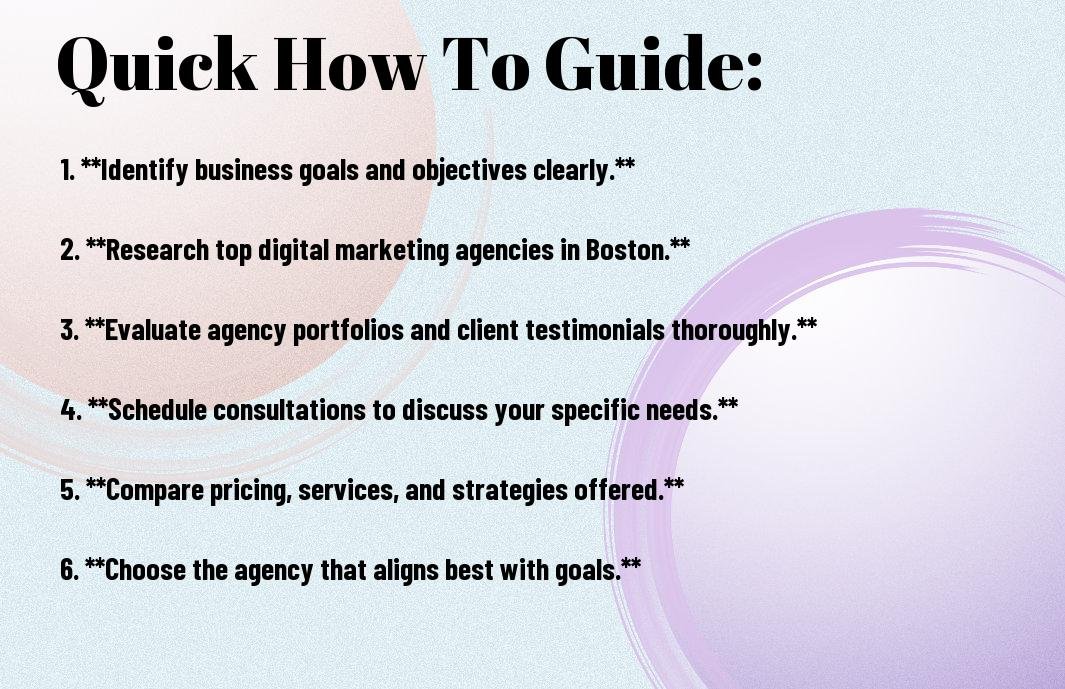There’s a world of opportunity waiting for you when you leverage the expertise of a top digital marketing agency in Boston, MA. By adopting the right practices, you can maximize your online presence, drive more traffic to your site, and ultimately boost your revenue. In this post, you will discover transformative strategies designed to help you make the most of your partnership with a professional agency, ensuring that your marketing efforts yield measurable success. Get ready to transform your digital marketing approach!
Key Takeaways:
- Collaboration: Establishing a strong partnership with your digital marketing agency is crucial for aligning goals and strategies to ensure effective campaigns.
- Analytics & Reporting: Implementing robust tracking and data analysis methods allows you to measure performance, optimize efforts, and make informed decisions based on campaign insights.
- Adaptability: Embracing an agile approach helps your business respond to ever-changing market trends and consumer behavior, maximizing the effectiveness of your marketing efforts.

Understanding the Value of a Digital Marketing Agency
Before plunging into the world of digital marketing, it’s crucial to grasp the multifaceted **value** that a top digital marketing agency can bring to your business. Working with an agency can amplify your marketing efforts, provide expertise in the latest digital trends, and ultimately drive your revenue growth. They bring a wealth of knowledge, allowing you to tap into strategies that may not be feasible with an in-house team. The investment in an agency isn’t merely about outsourcing tasks; it embodies a partnership that can push your business towards its larger **goals**.
How-To Assess Your Business Needs
You need to conduct a thorough evaluation of your current marketing strategies and identify gaps that a digital marketing agency can fill. Take the time to analyze your existing customer engagement, sales funnels, and overall brand presence. Understand what’s working and what isn’t; this will enable you to articulate your needs more clearly and ensure that potential agencies align with your specific objectives. Consider factors such as your target audience, industry trends, and competitors to shape your understanding of what is needed to elevate your presence in the digital landscape.
Tips for Identifying Key Marketing Goals
With a clear understanding of your business needs, it’s time to set specific, actionable marketing goals. These could range from increasing brand awareness to generating leads or enhancing customer retention. Use the SMART criteria—Specific, Measurable, Achievable, Relevant, and Time-bound—to frame your objectives effectively. This ensures that you’re not just setting vague aspirations but articulating clear targets that allow both you and the agency to evaluate success against tangible metrics.
- Establish SMART goals for greater clarity.
- Prioritize customer engagement initiatives that drive results.
- Focus on long-term strategic growth rather than quick fixes.
Recognizing the importance of specific goals will guide your collaboration with a digital marketing agency. The more precise your goals are, the easier it will be for the agency to create tailored strategies that align with your business objectives.
Tips for Identifying Key Marketing Goals
Tips for identifying key marketing goals include gathering feedback from your team about what you want to achieve and what might be prioritized. Consider conducting a SWOT analysis (Strengths, Weaknesses, Opportunities, Threats) to gain comprehensive insights into where your business stands and future opportunities. Moreover, look at industry benchmarks to determine realistic opportunities and set your targets accordingly. This alignment will not only enhance the partnership with the agency but also ensure a more relevant approach to your marketing strategies.
- Solicit team feedback to refine objectives.
- Use a SWOT analysis to understand your position.
- Benchmark against industry standards for realism.
Recognizing that your marketing goals are the foundation for your agency’s strategies will empower you to leverage their expertise effectively. By establishing clear, meaningful objectives, you will facilitate a productive working relationship, paving the way for enhanced outcomes and substantial growth in your marketing initiatives.
Selecting the Right Digital Marketing Agency
Now, when it comes to selecting the right digital marketing agency, you need to be strategic and informed in your approach. The agency you choose can be a pivotal element in the success of your marketing initiatives, so understanding their capabilities is crucial. It’s important to evaluate their experience and portfolio to ensure they align with your vision and business goals. This is where a systematic evaluation can help you filter out the noise and find a partner who can truly elevate your brand.
How-To Evaluate Agency Portfolios
With the rapid progression in the digital landscape, assessing the **portfolio** of potential agencies provides you valuable insights into their competencies and style. Take time to analyze the types of projects they have worked on in the past and examine the results they have achieved. Look for case studies that highlight their approach to problem-solving and campaign effectiveness. This will not only reflect their creativity but also their ability to drive **results** tailored to different industries.
In addition to project types, pay attention to the variety of **clients** they have served. A well-rounded portfolio demonstrates versatility and the ability to adapt strategies that resonate with diverse audiences. Make sure to look for metrics that showcase success, such as ROI or engagement statistics, which ultimately indicate their effectiveness. This analytical approach allows you to obtain a clearer picture of the agency’s **capabilities** and how they can contribute to your goals.
Factors to Consider: Reputation and Experience
Marketing strategies are often grounded in the **reputation** and **experience** of the agency. Understanding how long they have been in the industry can provide insights into their longevity and credibility. Agencies that have successfully navigated market fluctuations are more likely to offer you tested and proven strategies. Additionally, consider seeking out client reviews and testimonials to gauge the agency’s **trustworthiness** and adaptability.
- Agency’s **longevity** in the market
- Client **testimonials** and reviews
- Case studies showcasing **success**
After exploring specific qualifications, remember to maintain a focus on their alignment with your business ethos. A reputable agency with extensive experience will not only execute effective **campaigns** but also resonate with your brand’s voice, making for a smoother collaboration.
- Qualitative and **quantitative** case studies
- Industry **specialization**
- Openness to **communication** and collaboration
Portfolios inevitably tell a story, and that narrative can provide you with the confidence needed in your decision-making process. Consider taking a deep investigate how each shortlisted agency represents their past work and clients. Look for **scale** in projects and note how they respond to various market demands. This helps in further clarifying whether the agency’s style meshes with your expectations for your own marketing needs.
Tips for Shortlisting Potential Agencies
Portfolios are key, but you should also identify specific traits that matter most to you when shortlisting potential agencies. Keep an eye out for agencies that exhibit strong **communication** skills as well as a passion for continued learning and innovation. This often translates into a proactive approach to your needs and an eagerness to provide cutting-edge solutions. Make a checklist of the attributes that resonate with your company’s objectives to ensure you’re aligned from the start.
- Strong **communication** skills
- Proactive in **updating** strategies
- Cultural **fit** with your organization
This method of filtering agencies can eliminate those that may not meet your crucial criteria, allowing you to focus your energy on those that do.
How to effectively shortlist potential agencies comes down to ensuring that your final choices not only have the requisite skills but also embody a culture that aligns with your organization’s values. Once you identify agencies that showcase strong attributes along with a compelling portfolio, schedule a consultation to get first-hand insight into their operational style and passion for your field.
- Focus on a **collaborative** approach
- Assess willingness to **adapt** strategies
- Make sure they emphasize **transparency**
This step solidifies your understanding of what you can expect from your chosen agency, paving the way for a productive partnership moving forward.
To wrap things up, successfully selecting the right digital marketing agency involves a thorough evaluation of their portfolio, reputation, and experience along with tips for effectively shortlisting candidates. Make informed choices based on your unique requirements and you will find a partner that can genuinely contribute to your growth. By being diligent, you position your business to leverage the right expertise to meet your marketing goals successfully.

Building a Collaborative Relationship
Your partnership with a digital marketing agency can significantly influence the success of your campaigns if nurtured correctly. Building a collaborative relationship involves open dialogue, understanding shared objectives, and establishing mutual respect. The stronger your relationship, the more effectively your agency can tailor strategies specifically designed to elevate your brand in the competitive landscape of digital marketing in Boston, MA.
How-To Establish Clear Communication Channels
For effective collaboration, establishing clear communication channels is imperative. Regular check-ins and updates can keep both parties aligned on progress and changes. Consider using various communication tools such as email, video conferencing, and project management software to facilitate smooth dialogue. Set expectations for response times and designate primary points of contact within both your organization and the agency to streamline discussions.
For example, having a weekly meeting can ensure that both teams have touchpoints to discuss milestones, challenges, and upcoming tasks. This proactive approach mitigates misunderstandings and allows for swift modifications if needed. When everyone feels informed, the partnership can become truly collaborative and productive.
Tips for Setting Expectations and Objectives
Even before commenceing on your marketing journey with an agency, it’s crucial to set clear expectations and objectives. Start by outlining your overall goals and specific metrics for success. Consider what key performance indicators (KPIs) matter most to your business, whether that’s increasing web traffic, generating leads, or enhancing brand awareness. Make sure both your team and the agency understand these expectations to ensure alignment and accountability.
- Define your goals clearly.
- Agree on KPIs for measurement.
- Hold regular review meetings to assess progress.
Recognizing that both parties play a role in achieving these objectives helps foster a sense of teamwork. Sharing progress reports and being transparent with challenges can help maintain trust throughout the partnership, making it easier for both sides to pivot when necessary. A shared understanding of goals leads to more focused efforts and effective strategies.
Factors That Foster a Successful Partnership
Communication, trust, and flexibility are fundamental factors that can foster a successful partnership with your digital marketing agency. Effective communication not only involves relaying your vision and objectives but also includes active listening to the agency’s insights and suggestions. Cultivating trust allows both teams to feel comfortable sharing innovative ideas and honest feedback, which are vital for maximizing results over time.
- Maintain open lines of communication.
- Encourage a culture of transparency.
- Be adaptable as conditions change.
Thou must also recognize that flexibility in collaboration empowers both teams to experiment and innovate bravely, leading to unexpected and rewarding results. The more invested both parties are in the relationship, the greater the potential return on investment.
You can enhance this partnership by taking proactive measures to ensure consistent cooperation. Regularly evaluate the agency’s output in relation to your original goals and be prepared to recalibrate as needed. Engaging in brainstorming sessions or strategy workshops can promote further collaboration and generate fresh ideas that might lead to enhanced campaign performance.
- Engage in regular workshops.
- Celebrate wins together.
- Solicit feedback from both teams.
Thou must embrace this dynamic process, as it ultimately strengthens the partnership and yields impressive results in the ever-evolving digital marketing landscape.
Another aspect to monitor closely is the cultural fit between your organization and the agency. A compatible relationship enhances collaboration, making it easier to work towards common objectives and share resources effectively. As you grow together, fostering an atmosphere of sharing successes and learning from setbacks should become a priority, allowing both parties to evolve alongside the shifting demands of the market.
Defining Your Marketing Strategy
Many business owners underestimate the importance of a well-defined marketing strategy. To effectively tap into the expertise of a top digital marketing agency in Boston, MA, you must first articulate your vision and objectives. A clearly established marketing strategy not only provides direction but also aligns your team and resources, ensuring that every marketing initiative contributes to your long-term goals.
How-To Conduct a Comprehensive Market Analysis
For your marketing strategy to be effective, conducting a comprehensive market analysis is crucial. Begin by evaluating your competitors and understanding their strengths and weaknesses. Consider factors such as their market position, target audience, and marketing tactics. Additionally, gather data on market trends and consumer behaviors to ensure your strategy is relevant and timely. This in-depth analysis will equip you with valuable insights that can shape your approach.
Furthermore, utilize tools such as surveys and customer feedback to gain a deeper understanding of your target demographic. By paying attention to what matters to your audience, you’ll be able to align your marketing objectives effectively. Recall, the more you know about the landscape you’re operating within, the more informed your decisions will be. Competitor Analysis and Market Trends are key components here. Trust that a solid foundation in your market will enhance collaboration with the agency you choose.
Tips for Creating a Tailored Content Strategy
Little things can make a big difference when tailoring your content strategy. First, identify your audience personas to create content that resonates with their needs and interests. Consider the types of content that will engage them, such as informative blog posts, captivating videos, or interactive social media campaigns. Focus on delivering value in every piece of content to build trust and foster long-term relationships with your audience.
- Audience Personas
- Content Types
- Engagement
- Value Delivery
After understanding your audience and content types, monitor engagement metrics to fine-tune your strategy continuously. Regularly adjust your approach based on feedback and performance data; this ensures that your content remains relevant and effective over time.
Factors Influencing Channel Selection
Strategy should dictate your channel selection to increase efficiency and achieve desired results. Different digital channels serve varying purposes, and your choice should reflect your target audience’s preferences. Assess your audience’s typical online behavior and identify which platforms they frequent; this could be social media, email, or search engines. Additionally, your business objectives, such as whether you are aiming for brand awareness or conversions, will also shape your decisions on channel selection.
- Channel Preferences
- Online Behavior
- Brand Awareness
- Conversions
Recognizing the right balance of channels can drastically impact your marketing success. If you excel in selecting the right platform, you’ll achieve a more engaged audience and build stronger connections in that channel.
Tips for making informed choices about channel selection include staying attuned to emerging platforms and trends and maintaining a flexible approach to your strategy. This adaptability will enable you to pivot quickly as needed, ensuring you are positioned in front of your audience when it matters most.
- Emerging Platforms
- Flexibility
- Audience Positioning
Recognizing the importance of channel variety will keep your marketing strategy dynamic, allowing you to meet your audience wherever they are.
Content Strategy Alignment
Content plays a pivotal role in achieving your marketing goals. It serves as the voice of your brand and the means through which you communicate with your audience. Investing in a thoughtful content strategy that is aligned with your overall marketing strategy will yield positive outcomes in brand recognition, customer loyalty, and lead generation. Prioritize creating high-quality, relevant content that speaks to your audience’s challenges and aspirations, while also reinforcing your brand’s values.
- Brand Voice
- Customer Challenges
- Lead Generation
- Brand Values
After establishing a robust content strategy, ensure that it is regularly revisited and adapted to stay relevant in a changing digital landscape.
Monitoring and Measuring Success
Despite the best strategies, without effective monitoring and measurement, your digital marketing efforts can easily veer off course. To ensure you’re on the right path, it’s vital to establish robust methods for assessing your performance. By collaborating with a top digital marketing agency in Boston, MA, you can leverage their expertise to put in place quantifiable objectives, track your progress, and modify your tactics accordingly. This ongoing evaluation allows for a more adaptive strategy, ultimately leading to superior outcomes.
How-To Establish Key Performance Indicators (KPIs)
An imperative part of your measurement strategy is identifying Key Performance Indicators (KPIs) that align with your marketing goals. Determine what success looks like for your business by considering factors such as website traffic, conversion rates, or customer engagement metrics. This clarity will enable you to set measurable benchmarks, setting the stage for smooth evaluation and informed decision-making down the road.
It’s important to choose KPIs that not only reflect your current objectives but also can easily be tracked through analytics tools. Your KPIs should be realistic and relevant, offering a measurable path toward achieving your overarching business goals. This structured approach allows you to assess your campaign’s effectiveness and make necessary adjustments, supporting the continuous drive for improvement.
Tips for Utilizing Analytics Tools Effectively
KPIs can provide powerful insights, but they are only as effective as the tools you use to monitor them. To optimize your marketing strategy, it’s vital to utilize analytics tools effectively. Start by regularly reviewing your data and understanding patterns over time. Additionally, integrate multiple analytics platforms to gain a comprehensive view of your campaigns across various channels.
- Make use of real-time data to adapt strategies quickly.
- Utilize dashboards for visualizing performance metrics at a glance.
- Schedule regular reviews of your analytics data to spot trends early.
The consistent application of these practices will help you make informed decisions that positively impact your results.
Factors to Review for Continuous Improvement
To ensure your digital marketing strategies remain effective, regularly review key factors contributing to your campaign success. This includes your audience’s engagement levels, conversion rates, and overall return on investment. Consider using A/B testing to compare different marketing tactics and analyze which resonates best with your target audience. By routinely examining these aspects, you can continuously refine your approach, leading to sustained growth and success.
- Evaluate audience engagement to identify content that resonates.
- Analyze conversion rates for actionable insights.
- Utilize customer feedback to fine-tune your strategies.
The importance of these reviews cannot be overstated, as they foster an atmosphere of ongoing improvement that can significantly elevate your marketing results.
Success in digital marketing doesn’t come from a one-time effort but rather from your commitment to continuously monitor and measure your strategies. By setting up KPIs, effectively utilizing analytics tools, and constantly reviewing crucial factors, you’re putting yourself on a secure path towards achieving your marketing objectives. The meticulous nature of this process ensures that your digital marketing engagements are not only fruitful but also adaptable to the ever-changing landscape of the online marketplace.
- Maintain a focus on continuous improvement as a core principle.
- Invest time in understanding your audience and their needs.
- Be prepared to pivot your strategies based on quantitative data.
The ongoing dedication to monitoring and measuring your digital marketing efforts sets the stage for considerable success and growth.
Adapting to Trends and Changes in Digital Marketing
For businesses striving to remain competitive, adapting to the latest trends and changes in digital marketing is vital. The landscape of digital marketing is continually evolving, and keeping up with these shifts can help you leverage the expertise of a top digital marketing agency in Boston, MA. By taking proactive steps, you can ensure your marketing strategies align with current trends, ultimately driving better results for your business. If you’re interested in launching your own venture, check out this resource on How to Start a Digital Marketing Company: 7 Steps.
How-To Stay Informed About Industry Trends
There’s no shortage of resources available to keep you informed about the latest developments in digital marketing. Subscribing to industry newsletters, following influential marketing blogs, and utilizing social media platforms can significantly enhance your understanding of current trends. Connecting with professionals in your field through forums or industry events can also provide you with valuable insights and firsthand knowledge on how others are adapting to changes.
In addition, regularly attending webinars, workshops, and conferences can help you stay ahead of the curve. As the marketing landscape changes rapidly, it’s crucial to dedicate time each week to learn about emerging strategies and tools. By being proactive, you can position yourself to capitalize on shifting trends and better leverage your partnership with a digital marketing agency.
Tips for Leveraging Emerging Technologies
About the ever-evolving world of technology, you need to harness its power to enhance your digital marketing strategy. Leveraging tools such as automation, artificial intelligence, and data analytics can provide you with valuable insights into consumer behavior. Understanding how these technologies can optimize your marketing efforts can give you a competitive edge.
- Utilize automation tools to streamline your marketing processes.
- Implement artificial intelligence for personalized customer experiences.
- Analyze data thoroughly to make informed marketing decisions.
- Engage with new technologies as they emerge to stay relevant.
Any mistakes in not embracing these technologies could hinder your progress in the competitive marketplace.
Technologies are advancing rapidly, and it’s vital to remain open to innovation. Emerging technologies, including machine learning and chatbots, can greatly enhance customer engagements and efficiency. By continually assessing your technological tools and adapting them to meet new demands, you can significantly improve your marketing outcomes.
- Incorporate machine learning for better customer segmentation.
- Explore chatbot technology for enhanced customer support.
- Stay updated on new marketing technology releases.
- Use data analytics for performance evaluation.
Any missed opportunities may cause you to fall behind in the ever-shifting digital landscape.
Factors That Impact Marketing Adaptability
Now more than ever, understanding the factors impacting your marketing adaptability is crucial. Elements such as market demand, consumer behavior, and technological advancements can directly influence how swiftly you can pivot your strategies. The ability to embrace change, implement new technologies, and analyze market data is fundamental to staying competitive and relevant in today’s fast-paced digital world.
- Recognize shifting market demands and adjust accordingly.
- Monitor consumer behavior for informed decision-making.
- Adapt to technological advancements to stay ahead of competitors.
- Continuously evaluate your marketing strategies for optimal results.
Perceiving these factors will allow you to adapt efficiently and sustain your business growth.
It’s vital to recognize that several factors play a role in your marketing adaptability. Staying responsive to changes and trends not only keeps your strategies relevant but also helps build trust with your audience. By establishing a proactive approach, you can enhance your capability to adapt quickly, ensuring your business thrives amidst changes.
- Emphasize market responsiveness in your strategy.
- Identify consumer needs swiftly to drive engagement.
- Capitalize on technology shifts for sustainable growth.
- Keep your brand messaging aligned with market trends.
Perceiving the importance of these factors can make all the difference in your marketing success.
Final Words
Considering all points, leveraging a top digital marketing agency in Boston, MA, can be a transformative experience for your business. It allows you to access a wealth of expertise, innovative strategies, and cutting-edge tools that can propel your brand to the forefront of your industry. By engaging with professionals who understand the nuances of digital marketing, you can effectively enhance your online presence, reach targeted audiences, and ultimately drive conversions. The transformative how-to practices you’ve learned can serve as a guide to maximizing your relationship with the agency, ensuring that your objectives align and that you gain the most value from their services.
Your journey towards digital marketing success is marked by collaboration, strategic planning, and continuous evaluation. As you implement the practices discussed, remember to maintain open communication with your agency, share your goals, and remain adaptive to new insights and strategies they may present. With this mindset, you will not only leverage your agency’s capabilities but also cultivate an environment of growth and innovation that can elevate your brand in the competitive landscape. Empower yourself with the knowledge gained and take the next step towards achieving your marketing goals.
FAQ
Q: What are the key benefits of partnering with a top digital marketing agency in Boston, MA?
A: Partnering with a top digital marketing agency in Boston, MA, offers numerous benefits. Firstly, these agencies have a wealth of experience and expertise in digital marketing strategies, ensuring that your business stays competitive in the ever-evolving digital landscape. They provide tailored services, ranging from SEO and content marketing to social media management and PPC advertising, allowing you to reach your target audience effectively. Furthermore, established agencies often have access to advanced tools and analytics, enabling data-driven decision-making that can enhance your marketing efforts and increase ROI.
Q: How can I ensure that I select the right digital marketing agency for my business needs?
A: To select the right digital marketing agency, start by assessing your specific business goals and needs. Create a list of priorities, such as improved online presence, lead generation, or brand awareness. Next, research agencies in Boston, looking for those that specialize in your niche and have a proven track record of success. Consider requesting case studies and client testimonials to gauge their effectiveness. Additionally, schedule consultations to discuss strategies and ask about their approach to collaboration. The right agency should align with your vision and be adaptable to evolving your marketing strategies over time.
Q: What transformative practices can I implement to maximize my collaboration with a digital marketing agency?
A: To maximize your collaboration with a digital marketing agency, consider implementing the following transformative practices. First, engage in open and transparent communication; clearly express your goals, expectations, and any concerns. Establish regular check-ins to discuss progress and changes in strategy. Second, share any relevant data on your audience and past marketing efforts to provide the agency with a strong foundation for developing tailored campaigns. Lastly, foster a mindset of adaptability; be willing to experiment with new tactics and embrace feedback to evolve your marketing efforts in response to market trends and consumer behavior.



